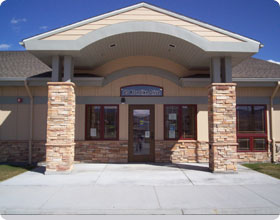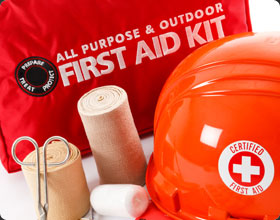Prepare a Survival Kit
Once you have made your kit, store it in a convenient place known to all family members. Keep a smaller version of the kit in the trunk of your car, and keep items in airtight plastic bags. Change your stored water supply every six months so it stays fresh, and rotate your stored food every six months. Rethink your kit and family needs at least once a year. Replace batteries, update clothing, and so forth. Ask your physician or pharmacist about storing prescription medications.
Below is a list of supplies recommended by the Federal Emergency Management Agency (FEMA), Disaster Preparation at Prepare Now and the American Red Cross to help get you through an emergency if you are either confined to your home or evacuated.
Water: Store water in plastic containers such as soft drink bottles. Avoid using containers that will decompose or break, such as milk cartons or glass bottles. A normally active person needs to drink at least two quarts of water each day, but hot environments and intense physical activity can double that amount. Children, nursing mothers and ill people will need more water as well. A good rule of thumb is to store one gallon of water per person per day, allowing for half to be used for drinking and half to be used for food preparation and sanitation. Keep at least a 3-day supply of water for each person in your household.
Food: Store at least a 3-day supply of non-perishable food. Select foods that require no refrigeration, preparation or cooking, and little to no water. If you must heat food, pack a can of sterno. Select food items that are compact and lightweight. Include a selection of the following foods in your kit:
- Ready-to-eat canned meats, fruits and vegetables
- Canned juices, milk and soup (if powdered, store extra water)
- Staples such as sugar, salt and pepper
- High-energy foods such as peanut butter, jelly, cracker, granola bars and trail mix
- Vitamins
- Food for infants, elderly persons or persons on special diets
- Comfort foods such as cookies, candy, sweetened cereals, lollipops, instant coffee and tea
First Aid Kit: Assemble a first aid kit for your home and one for each car. Each kit should include non-prescription drugs such as aspirin, pain relievers, anti-diarrhea medicine, antacids and laxatives, as well as the following items:
- Adhesive bandages
- 2″ and 4″ sterile gauze pads
- Hypoallergenic adhesive tape
- 2″ and 3″ sterile roller bandages
- Scissors, tweezers and a needle
- Moistened towelettes
- Antiseptic
- Thermometer
- 2 tongue blades
- Tube of petroleum jelly or other lubricant
- Assorted sizes of safety pins
- 2 pairs of latex gloves
- Sunscreen
Tools and Supplies: Keep the following tools and supplies on hand:
- Paper plates and cups and plastic utensils
- Emergency preparedness manual
- Battery-operated radio and batteries
- Flashlight and batteries
- Cash, travelers checks and change
- Manual can opener and utility knife
- Small fire extinguisher
- Tube tent
- Matches in a waterproof container
- Plastic storage containers
- Signal flare
- Bleach
- Medicine dropper
- Shut-off wrench
- Whistle
- Plastic sheeting
- Tape
- Disinfectant
- Pliers
- Compass
- Plastic bucket with lid
- Needles and thread
- Garbage bags and ties
- Personal hygiene items
- Aluminum foil
- Feminine supplies
- Map of your area
- Toilet paper and moist towelettes
- Soap and liquid detergent
- Paper and pens / pencils
Clothing and Bedding: Include at least one complete change of clothing and footwear per person:
- Sturdy shoes or work boots
- Rain gear
- Blankets or sleeping bags
- Hats and gloves
- Thermal underwear
- Sunglasses
For Baby:
- Formula
- Bottles
- Powdered milk
- Diapers
- Medications
For Adults:
- Heart and blood pressure medications
- Insulin
- Other prescribed medications
- Denture needs
- Contact lenses and supplies, extra eyeglasses
For Entertainment:
- Books
- Board games
- Puzzles
Important Family Documents: Keep the following records in a portable, waterproof container
- Will, insurance policies, contracts, stocks and bonds
- Passports, social security cards, immunization records
- Bank account numbers
- Credit card account numbers and company information
- Inventory of valuable household goods and important phone numbers
- Family records such as birth, marriage and death certificates


